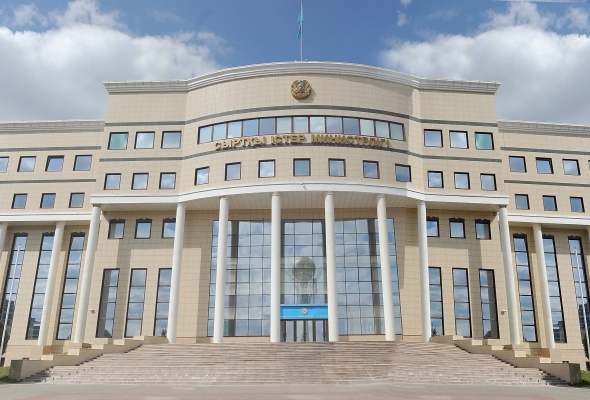ASTANA – The Foreign Ministry of Kazakhstan issued a statement on July 15 In which it welcomed the Joint Comprehensive Plan of Action over the Iranian nuclear programme approved a day earlier in Vienna. The deal is the result of nine years of talks between Iran and the P5+1 group of international mediators: the U.S., Russia, China, France, the U.K. and Germany.

“Strict implementation of this plan will enhance the nuclear non-proliferation agenda [and] help each member of the Nonproliferation Treaty exercise their lawful right to engage in peaceful nuclear activities, provided there is strict compliance with the provisions of the Treaty and IAEA [International Atomic Energy Agency] requirements,” the statement read.
According to the Foreign Ministry, the agreement is “further evidence that diplomacy is the only way to resolve complex international issues.”
In terms of regional implications, Astana believes that the deal “will have a positive impact on the economic and social development of all countries in the region, and will further strengthen cooperation between Kazakhstan and Iran.”
Noting that Astana has “consistently advocated for peaceful dialogue and negotiations” on the Iranian nuclear programme, the Foreign Ministry added that Kazakhstan “was proud to have made a practical contribution to the negotiations on Iran’s nuclear programme” by hosting two rounds of talks in February and April 2013 at the initiative of President of Kazakhstan Nursultan Nazarbayev. The meetings that took place in Almaty encouraged “an atmosphere of trust between Iran and the P5+1 and contributed to the achievement of the Joint Comprehensive Plan of Action,” the ministry said.
Previously, Iran and the P5+1 negotiators commended Kazakhstan’s support in searching for a diplomatic solution to the complex issue. Following the agreement in Vienna, Russian Minister of Foreign Affairs Sergey Lavrov, who has been among the six international negotiators with Iran since the launch of talks in 2006, also welcomed Kazakhstan’s contribution, along with Austria and Switzerland, who also hosted talks.
“At a certain stage, some rounds were hosted by our Kazakh friends. All of [the hosts] helped create the conditions that helped everything to conclude in the way that it eventually did,” he noted while answering questions from the media in Moscow on July 16.
According to reports from Vienna, the plan of action sets significant limits on Iran’s sensitive nuclear activities. Among other concessions, Iran has obliged itself to reduce its stockpile of enriched uranium – used to make reactor fuel, but also nuclear weapons – by 98 percent to 300 kilogrammes for 15 years. The Middle Eastern nation also agreed to cut, at least for a decade, the number of centrifuges it has to enrich uranium by two-thirds, to 5,060.
The IAEA will need to verify the Iranians’ compliance with the agreement terms, following which the UN, EU and U.S. will lift the sanctions imposed on Tehran for its previous lack of engagement with the global nuclear watchdog. Media reports say this includes the release of more than $100 billion in frozen assets, mainly in Western banks. Among the deal’s conditions is also the possibility of reinstating sanctions if the international community finds that Iran is not complying.
One of the deal’s solutions to the problem of how Iran could renounce its stockpile of enriched uranium refers to the IAEA Bank of Low Enriched Uranium (LEU) that is being created in Kazakhstan. According to the annex to the Joint Comprehensive Plan of Action, “Iran may choose to seek to sell excess enriched uranium to the IAEA fuel bank in Kazakhstan when the fuel bank becomes operational.” Reportedly, the LEU bank is expected to launch its activities two years following the signing of the Country Agreement between the IAEA and Kazakhstan scheduled to take place in Astana in late August.
Commenting on the deal, Deputy Director of the Kazakhstan Institute of Strategic Studies Sanat Kushkumbayev said it was “difficult to overestimate the importance of this agreement.”
According to the analyst, “its implementation will enhance a whole system of regional and global security, as normalisation of Iran’s relations with the leading global actors has far-reaching implications not only for the Middle East but also for the neighbouring regions, Central Asia in particular. Tensions caused by the Iranian nuclear programme and risks of another conflict flaring up there were seriously affecting the international relations system.”
“Reaching consensus in these matters is important, positive news for Kazakhstan, as we can now look forward to the expansion of trade and economic links with Iran and through its territory with the Persian Gulf area, the countries of the Middle East and South Asia,” Kushkumbayev concluded.

